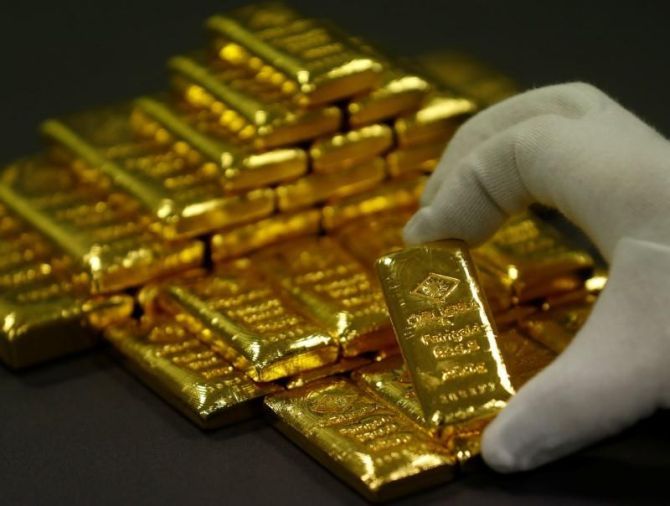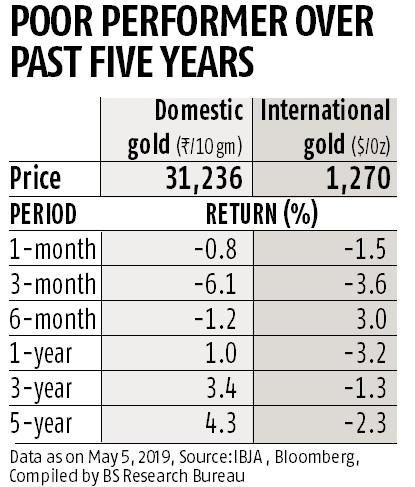On gold buying occasions such as Akshaya Tritiya, Chiraj Mehta points out, investors are often confronted with the question: Should I make just a token purchase, or should I buy more towards building my allocation in the yellow metal?

One of gold's most admirable qualities is its unchanging nature.
Not only does it retain its shape and characteristics, more importantly, it also preserves its value over the long term.
As financial commentator Peter A Burshre once commented: 'Regardless of the dollar price involved, one ounce of gold would purchase a good quality man's suit at the conclusion of the Revolutionary War, the Civil War, the presidency of Franklin Roosevelt, and today.'
No wonder this imperishable and non-diminishing asset is synonymous with Akshaya Tritiya, a day meant to mark prosperity and wealth in Indian culture.
But while we Indians love gold, it's time we evolved from amateur consumers of gold to intelligent investors in the yellow metal.
One should adopt a staggered approach to purchasing gold in order to enjoy the benefit of lower average costs.
A 10% allocation to it at all times also makes an investor's portfolio well diversified.
However, on gold buying occasions such as Akshaya Tritiya, investors are often confronted with the question: Should I make just a token purchase, or should I buy more towards building my allocation in the yellow metal?
Macro-economic backdrop is favourable:
This Akshaya Tritiya seems like a good time to load up on the yellow metal as the risk-reward dynamics favour the yellow metal while the downside appears limited.
The year 2018 was the first time central banks tried to remove some liquidity from the markets after a decade of providing stimulus.
They have tried to get out of this low interest rate trap but they aren't able to.
The market has become addicted to cheap liquidity.
It doesn't look like that is going to change anytime soon.
The world continues to remain in a state of great disequilibrium, both with respect to the global economy and geopolitics.
Such a scenario should be constructive for gold in the medium to long term.

Strength of dollar acting as impediment:
Despite a rosier outlook, gold's gains have so far been impeded by the dollar's strength and rising risk appetite which is diverting flows towards equities.
The US economic momentum, fuelled earlier by stimulus, tax cuts and cheap liquidity, is clearly facing headwinds.
The US economy isn't doing very well, but that has not prevented the dollar from gaining value.
The market's appetite for US dollars is driven by a few factors, mainly the relative performance of its economy, equity markets, and bond yields, but most importantly, by growth abroad.
While US interest rates are falling, the real yield differential moved in favour of the dollar because the economic outlook for the rest of the world is even worse.
Buoyant US equity markets have been attracting significant flows, thereby further supporting the dollar.
But with rate hikes off the table, the slowdown in earnings growth may soon start reflecting in the equity markets, reducing another support for the dollar.
The price of gold and the strength of the dollar have a clear inverse relationship.
There has been a constant deterioration in the quality of the dollar as a reserve currency due to historic debt levels and the Fed's unorthodox monetary policies.
In a scenario where other major currencies like the Euro and Yen are plagued with problems of their own, no currency is in a state to dethrone the dollar immediately.
But many countries want to put an end to the dominance of the US, and have hence entered into non-dollar bilateral agreements.
Thus, a reduction in dollar's share in international payments looks imminent.
Recognising that the rules of the international monetary system are changing, the relevance of gold is rising.
Fed's policy turn could provide a boost:
If the Fed takes a U-turn in policy as a response to slowing growth, lower inflation or falling asset prices by beginning to cut rates, or if it adopts further unconventional measures like quantitative easing (QE), it will be perceived by the markets as central banks being caught in a trap due to which they will not be able to normalise monetary policy.
This will provide a big boost to gold.
US-EU trade war brewing:
If one goes by the comments of the leaders of the two nations, a US - China trade deal seems a given and has been priced in by the markets to a large extent.
However, that doesn't mark the end to Trump's trade wars.
While one seems to be drawing to a close, another is brewing.
The European Union has said it's preparing retaliatory tariffs against the US over subsidies to Boeing.
This has significantly escalated transatlantic trade tensions.
The threat of new European retaliatory tariffs comes hours after Washington vowed to hit the EU with duties over its support for the Airbus.
Trump is threatening tariffs on various EU products, including car and car-part imports.
An intensification of the EU-US trade war could soon impact global markets.
These developments could undermine confidence and investments in risky assets, thus pushing up demand for gold.
Slowing global growth:
World leaders, the International Monetary Fund, and central bank chiefs across the globe are all speaking of slower growth.
Just the end of QE globally has pushed the financial world over a cliff.
Increase in interest rates, lower liquidity and trade wars are leading to economic adjustments that the world is nowhere prepared for.
Use and abuse of unconventional monetary tools by central banks has led to extreme economic conditions becoming the new normal.
This ill-conceived and unsustainable policy making will provide a big boost to gold prices in the medium to long term.
Gold has traditionally been a major beneficiary of crumbling faith in the monetary authority due to its inverse relationship with paper assets like stocks and currencies, something that is unlikely to change.
Given this macroeconomic picture, gold will be a useful portfolio diversification tool that can reduce overall portfolio risk.
Move beyond physical gold:
To make the move from consumer to investor, it is imperative now for us to move beyond our obsession with physical gold.
This inefficient preference for holding physical gold has prevented investors from optimising their gold investments.
Not only do you end up paying a high price for this obsession, it is also prone to a number of risks, the most important one being that related to purity.
At the retail level, gold is primarily bought for two reasons--adornment and investment.
Both are very distinct needs, and consumers will benefit if they realise that they are best met by different forms of gold.
Physical gold like jewellery, coins and bars are best suited for adornment and gifting, that is, self-consumption, while financial forms are a preferable avenue for investment.
So, this Akshaya Tritiya pick your gold investment wisely.
Chirag Mehta is senior fund manager, alternative investments, Quantum Mutual Fund.











 © 2025
© 2025